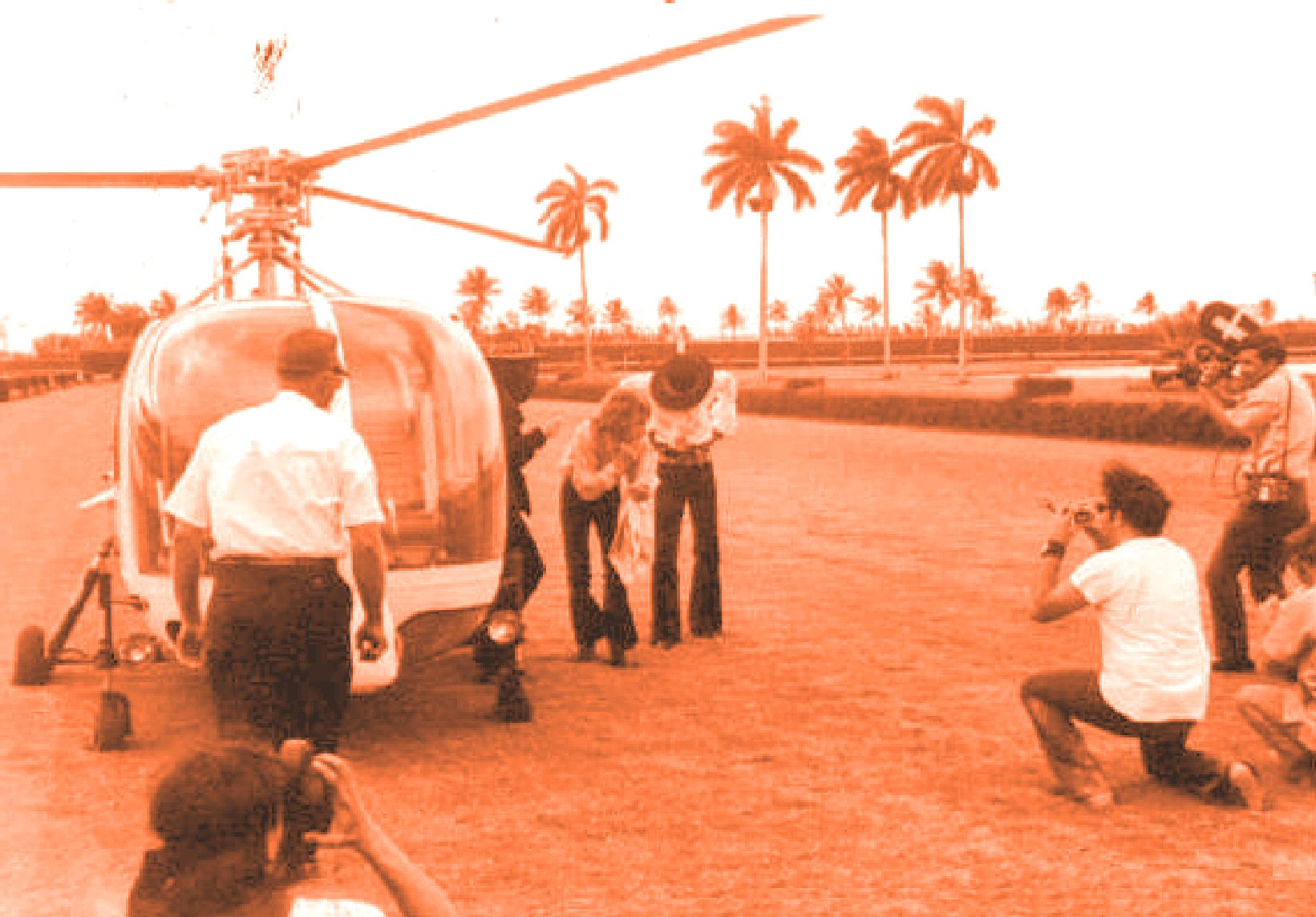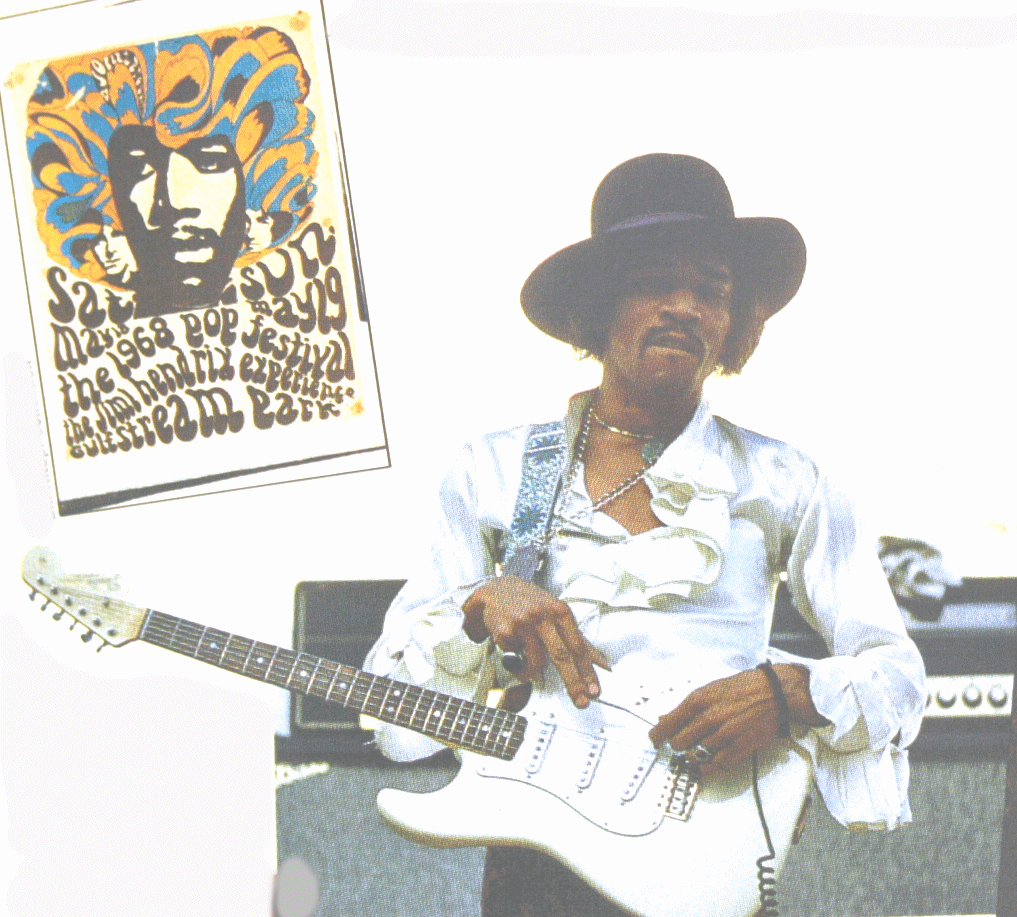Twenty-three year old Michael Lang ran one of the first head shops in Florida. In 1968 he went into show business and organized
the Miami Pop Festival. On a weekend in May, Miami's
"Underground Festival" presented
the Mothers Of Invention, Blue Cheer, Chuck Berry, John Lee Hooker, Blues Image, Tiny Tim, and
Arthur Brown. Miami Pop also hosted the last two gigs of a three-month long American tour by
the Jimi Hendrix Experience.
"We couldn't figure out how to build stages quickly that would hold everybody securely," Lang later wrote about
Miami Pop. "We called around and found six flatbed trucks and rolled them onto the track. We set them up two by two so that we could structure the show on three rotating stages. It was going to be a two-day event; two shows a day, afternoon and evening. We rented out booths to sell head-shop gear and assorted psychedelia. We managed to get everything arranged and the crowds came. After the music began we realized somebody had forgotten to pick up Hendrix at the airport. I sent cars out to get him, but Jimi had gotten impatient and decided to rent a helicopter. This turned out to be beautiful. Just as Jimi was due to go on stage and we were going berserk, this helicopter came hovering over the stage and Jimi comes down a ladder.
He played an incredible set...
The second day we almost got rained out. We had been in the middle of a drought, so we hadn't bothered to get rain insurance. Sunday morning the city decided to seed the clouds. No one would go on stage because they were afraid of being electrocuted. I guess the seed for
Woodstock was sown during the
Miami Pop Festival."
By 1968 the mushrooming rock industry required alternative settings in which artists, writers, producers, and engineers could interact without regard for what labels the participants were signed to. In October
Rolling Stone profiled California's "Recording Farm" and "Operation Brown Rice" projects. The concept was touted as "a retreat, a quiet place in the country where musicians can get their heads together...to free artists from the urban pressures...and to permit emancipated music to pass through them and back into the city."
In February 1969 a similar plan was hatched for the East Coast when Michael Lang met Artie Kornfeld in the Manhattan offices of
Captiol Records. Kornfeld was the young A&R executive for
Captiol who'd made his mark as producer and lyricist for the
Cowsills. Lang had recently closed his Coconut Grove head shop and moved to the Upstate New York town of Woodstock. Woodstock was one of the few art colonies established in the country since the turn of the century. Lang took up residency in an area that was home to
Bob Dylan,
The Band,
Tim Hardin,
Lovin' Spoonful, and many other musicians, including a group that Michael managed. Pursuit of a record deal brought Lang to the offices of Artie Kornfeld.
With so much musical talent basking in Woodstock's rustic Catskill tranquility, Lang was quick to persuade Kornfeld of the need for an Upstate recording retreat. Between them they had the expertise to launch such a venture, provided they could find investors.
Inquiries lead them to the offices of a young law school graduate named Joel Rosenmann and his twenty-four year-old business partner, John Roberts. As an heir to the Block Drugs pharmaceutical empire, Roberts had already received a quarter million dollars of his inheritance, and he was due for an additional $3 million in installments.
Roberts and Rosenmann had recently invested in a Manhattan recording studio. They were ready to expand their interests when Lang and Kornfeld proposed the Upstate retreat. After a couple of meetings, the foursome hit on the idea of introducing themselves to Woodstock's musician colony by staging a concert gala in the area. At first Kornfeld and Lang remained more interested in the studio idea. But Roberts and Rosenmann had the capital, and the last word. "We made a deal," recalls Joel, "we'd have the party and the profits from the party would be used to pay for the recording studio."
Once the notion took hold, Woodstock Ventures was born. The concert idea soon ballooned into full blown plans for the mother of all festivals. With John Roberts' bottomless "credit line in the sky" backing the plan, Michael Lang assumed the roll of
charges d' affaires in orchestrating what would become the party of the century.









